How To Get Rid Of Junk Mail
This Is How You Can Stop Getting So Much Junk Mail—For Good
How disappointing is it to see a big stack of mail only to find out it's all credit card offers and weird catalogs? Make it stop with this comprehensive guide to getting junk mail out of your life.
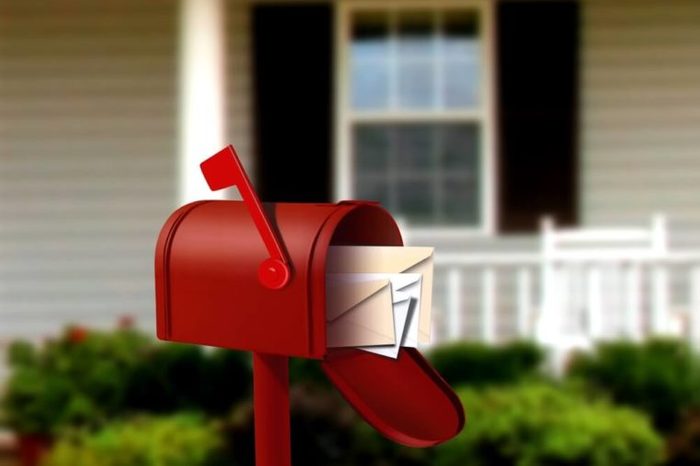 Aina Jameela/Shutterstock
Aina Jameela/Shutterstock
Why so much junk mail?
Hundreds of millions of pieces of junk mail (also called "direct," "bulk," or "standard" mail) are sent through the U.S. Postal Service (USPS) annually, none of them solicited or requested by the recipient and most entirely unwanted. That avalanche of credit card offers, insurance offers, catalogs, flyers, coupons, phone books, and anything else you didn't specifically ask for is vying for your attention and seemingly bent on the eradication of our forests. These companies apparently get enough responses to justify their excessive mailings, but that doesn't mean you have to take it lying down. Here's a guide to stemming the flow of junk mail. Here's what to do if your package arrives damaged, or not at all.
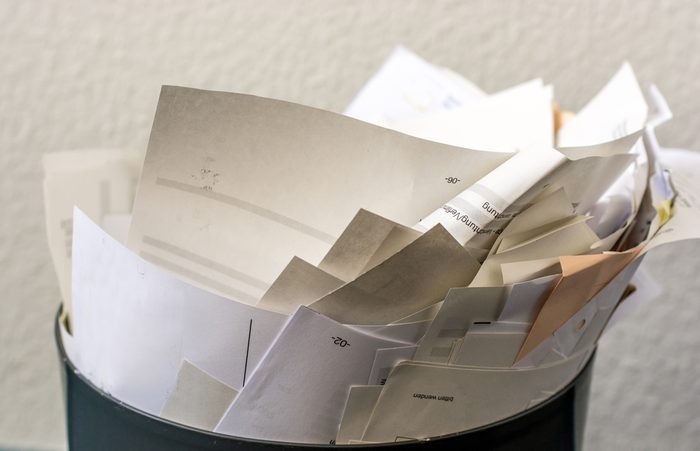 Ralf Geithe/Shutterstock
Ralf Geithe/Shutterstock
What's wrong with junk mail?
Junk mail comes at a huge cost to our quality of life. Sorting, reading, and recycling junk mail takes time away from your daily activities, not to mention creating a mess. Not convinced it's a big intrusion? According to EcoCycle.org, one of the largest non-profit recyclers in the United States, you could spend up to eight months of your life dealing with junk mail. And there are actual threats to this mailbox onslaught: Junk mail exposes your private info by sharing your name, address, and purchasing habits with marketers around the country. And all those credit card offers could put you at risk of identity theft.
 Ulrich Mueller/Shutterstock
Ulrich Mueller/Shutterstock
Junk mail and the environment
There's also the ecological impact of all that junk mail to consider. Here are some horrifying facts from the New York University School of Law about junk mail and sustainability:
- 5.6 million tons of catalogs and other direct mail advertisements end up in U.S. landfills annually.
- 44 percent of junk mail is thrown away unopened, but only half that much junk mail is recycled.
- The average American household receives 848 pieces of junk mail, which equals 1.5 trees every year and more than 100 million trees for all U.S. households combined. That's the equivalent of deforesting all of Rocky Mountain National Park every four months.
- Largely due to deforestation, junk mail manufacturing creates as much greenhouse gas emissions annually as 3.7 million cars.
Concerned about the environment and sustainability? Here are 25 ways you can reduce your own carbon footprint.
 cjmacer/Shutterstock
cjmacer/Shutterstock
To stop junk mail, understand why you get it in the first place
USJunkMail.com, a service that can help reduce the volume of junk mail in your mailbox, defines junk mail as "the product of large direct mail companies who enter into reduced postage rate arrangements with the USPS in order to send massive amounts of paper catalogs, solicitations, coupons, postcards and flyers to mailing addresses across the nation." These companies get your address from public records, phone directories, club memberships, credit applications, and even the USPS itself. Direct Mail and the Data & Marketing Association (DMA) are two of the largest providers of consumer information to direct marketers. If the proper postage is affixed, the USPS is legally required to deliver that junk. However, you also have some legal rights to turn off the junk-mail hose. Check out more surprising facts about USPS.
 Andrey_Popov/Shutterstock
Andrey_Popov/Shutterstock
Opt out of credit and insurance offers
If you decide that you don't want to receive prescreened offers of credit and insurance, you have two choices, according to the Federal Trade Commission (FTC). You can opt out for five years or forever.
To opt out for five years: Call toll-free 1-888-5-OPT-OUT (1-888-567-8688) or visit www.optoutprescreen.com. The phone number and website are operated by the major consumer reporting companies.
To opt out permanently: You may begin the permanent Opt-Out process online at www.optoutprescreen.com. To complete your request, you must return the signed Permanent Opt-Out Election form, which will be provided after you initiate your online request.
When you call or visit the website, you'll be asked to provide some personal information, including your home telephone number, name, Social Security number, and date of birth. The information you provide is confidential and will be used only to process your request to opt out. Here are 13 more things credit card companies know about you.
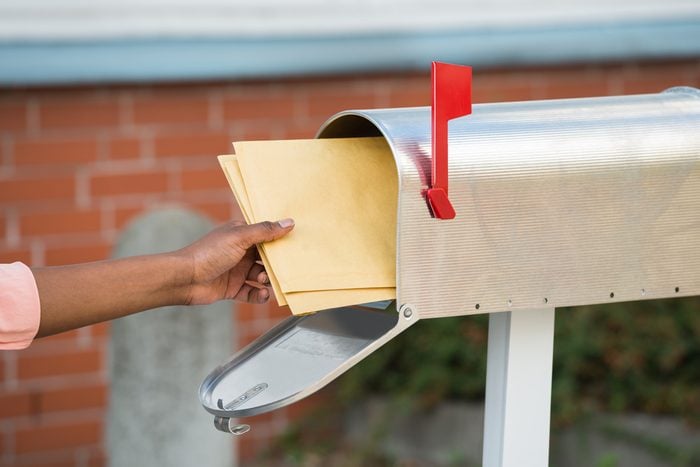 Andrey_Popov/Shutterstock
Andrey_Popov/Shutterstock
How to opt out of prescreened offers via snail mail
For those without Internet access, a written request can be made to each of the major consumer reporting companies, although you'll still need to include the same sensitive information (home telephone number, name, Social Security number, and date of birth).
Here are the addresses for the major reporting companies:
Experian
Opt Out
P.O. Box 919
Allen, TX 75013
TransUnion
Name Removal Option
P.O. Box 505
Woodlyn, PA 19094
Equifax, Inc.
Options
P.O. Box 740123
Atlanta, GA 30374
Innovis Consumer Assistance
P.O. Box 495
Pittsburgh, PA 15230
Opting out of these offers—either digitally or through the mail—will have no effect on your ability to apply for or obtain credit or insurance, according to the FTC. Don't miss these surprising things your mail carrier will never tell you.
 Aleksandr Mokhnachev/Shutterstock
Aleksandr Mokhnachev/Shutterstock
Opt out of direct mail
According to NYU Law School, Direct Mail has a free opt-out service available online. By completing the "National Do Not Mail List" form, you can indicate if there are any types of mailings you would like to receive from the list provided. Direct Mail will then contact you every six months via email so you can review and update your preferences.
DMA charges a handling fee in order to opt out of the mailings for which they've provided your consumer information. If you register online, the handling fee is $2. To use the mail-in option, send your opt-out request ("I do not wish to receive any unsolicited advertising, sales or other mail solicitations at this address"), along with your name (and all variations thereof), address, and signature along with a $3 processing fee (check or money order payable to DMA) to:
DMAchoice
Data & Marketing Association
P.O. Box 643
Carmel, NY 10512
According to NYU School of Law, neither Direct Mail nor DMA can guarantee your name will be removed from every mailing list on which it appears. In addition, DMA offers registration for its eMail Preference Service (reduce your unsolicited commercial email). You should also learn the truth about the Do Not Call list.
 file404/shutterstock
file404/shutterstock
Opt out of catalogs
When you order something from a catalog, your name and address are likely given to Abacus, an alliance of catalog and publishing companies. To have your information removed from Abacus, contact them with your name (including any middle initial), current address, and previous address if you moved recently. Abacus can be reached either via email ([email protected]) or by mail (Abacus, Inc,. PO Box 1478, Broomfield, CO 80038). Abacus also has a website that can help remove you from some (but not all) of their catalogs.
In addition, there is a service called Catalog Choice, a free service that allows you to cancel specific catalogs (and other types of paper mail) you no longer wish to receive. To find out if the junk catalogs you're receiving can be opted-out through Catalog Choice, you simply search their names on Catalog Choice's website. Although the service is free and not-for-profit, they do accept online donations.
 Iryna Tiumentseva/Shutterstock
Iryna Tiumentseva/Shutterstock
Opt out of magazine subscription offers
Whenever you subscribe to a magazine, join a group, or make a donation and supply them with your name and address, you can specifically ask that they not rent your name to other companies. Your request may be ignored, so it is best to contact them a few weeks later and make this request again. Here's how to contact Reader's Digest.
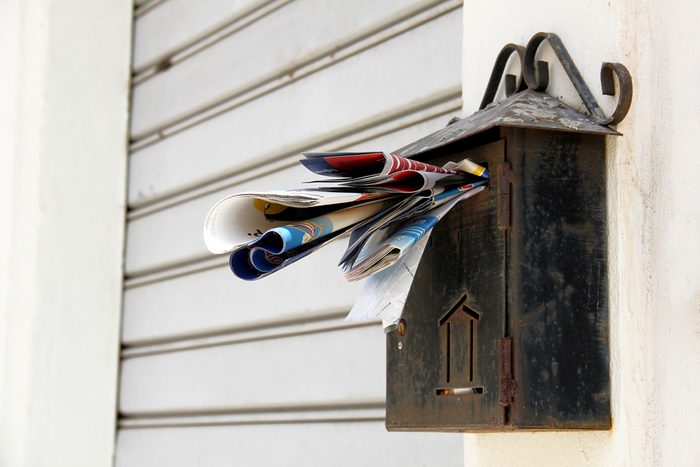 Flash-ka/Shutterstock
Flash-ka/Shutterstock
Opt out of (additional) requests for donations from charities
We know you like donating to worthy causes, but maybe you'd like to take some control over all the requests for additional donations. The American Institute on Philanthropy offers the following tips on reducing junk mail and solicitations from charities:
- When you give money to a charity or nonprofit group, enclose a note requesting that the organization not rent, sell, or exchange your name, address, and giving history with anyone else. You can make future contributions contingent on the charity honoring your request.
- If you donate to a charity once per year, ask the organization to decrease the frequency of its mailings.
- If you do not wish to support a charity, ask for your name to be deleted from its mailing lists.
Getting unsolicited calls from organizations asking for money is another issue. Find out how to get rid of telemarketers for good.
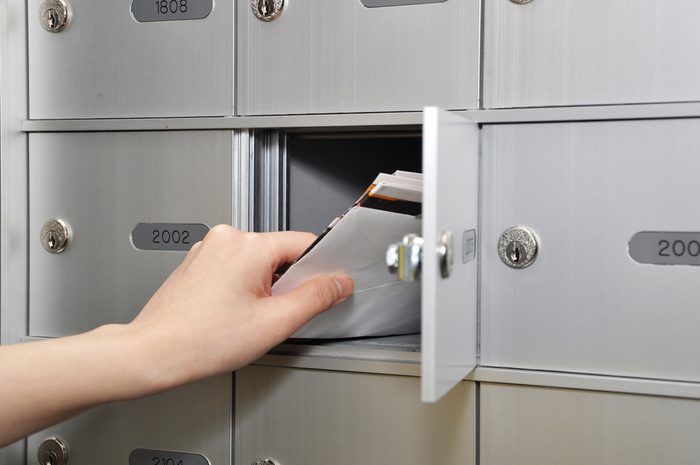 Icatnews/Shutterstock
Icatnews/Shutterstock
Refuse delivery of (certain) promo mailings
First, look for any of the following phrases on any promotional mailing sent to "resident," "current resident," or "current occupant":
- return service requested
- forwarding service requested
- address service requested
- change service requested
- First Class Mail
You can mark these envelopes "RETURN TO SENDER," and put them right back in your mailbox. Check out these secrets identity thieves don't want you to know.
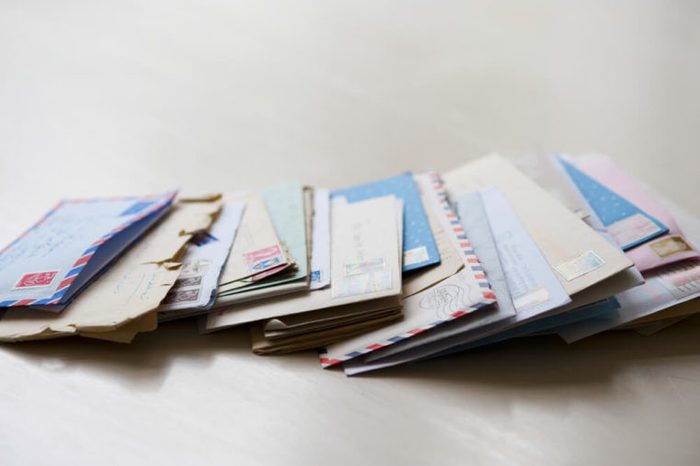 sirtravelalot/Shutterstock
sirtravelalot/Shutterstock
Stop-gapping
Unfortunately, DMA is not the only organization that compiles and sells information to senders of junk mail. So, you will likely need to supplement your DMA opt-out with additional opt-out requests. These include requests to:
- SKUlocal, formerly Cox Target, which is responsible for sending you those promo-coupon-filled Valpaks, among other things
- RetailMeNot, formerly RedPlum (another promo-coupon mailing)
But you should also pay attention to other unwanted mailings that seem to have slipped through the cracks despite your other efforts, and then contact the senders of those mailings individually.
 wk1003mike/Shutterstock
wk1003mike/Shutterstock
Make sure the junk mail stays away
Contact your banks, credit card companies, and utilities and tell them not to release your name, address, Social Security number, email address, or phone number to anyone for any type of marketing or promotional reasons. If you decide to do this in writing, do so without giving out any information other than the name on your account, and keep a record. Next, don't miss these tips for opting out of basically anything.
Sources
- EcoCycle: "Frequently Asked Questions about Junk Mail"
- USJunkMail.com
- Federal Trade Commission: "Prescreened Credit and Insurance Offers"
- Federal Trade Commission: "Stopping Unsolicited Mail, Phone Calls, and Email"
Originally Published: December 09, 2020
Sign up for articles sent right to your inbox
Enjoy the best stories, advice & jokes delivered right to your inbox!

Subscribe & SAVE Save Up To 84%!
How To Get Rid Of Junk Mail
Source: https://www.rd.com/list/how-to-stop-getting-junk-mail/
Posted by: chatmanthavir.blogspot.com

0 Response to "How To Get Rid Of Junk Mail"
Post a Comment